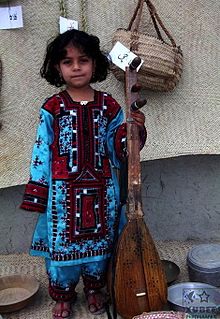
Balochi music is the musical traditions of the Baloch people and music in the Balochi language.[1] The Baloch people have a rich oral tradition that includes poems and songs to celebrate or commemorate many events such as religious rites, festivals, or holidays and dance.[2][3]
Types of Baloch songs include Balochi praise songs (sipatt and nazenk), love songs (dastanag), elegies (Mōtk or Mowtk.), lullabies (lilo), wedding and circumcision songs (halo and lado), songs of separation (zahirok, liko), epics (sher), fishermen’s songs (amba and lewa), healing songs ( gwati, sheki, sheparja, and malid, Zar), and Zikri ritual songs.[3][4]
As with spoken language, Baloch music varies from region to region.[5]
Balochi music has been very popular in Iran, Oman and Pakistan.
Music instruments
[edit]Instruments in traditional Balochi music include suroz, donali, ghaychak, dohol, sorna, rubab, kemenche, tamburag and benju.[3][4][6][7][8]
History
[edit]The Balochi zahirok dates back to the 15th century,[8] and some Baloch think it is the original form of Balochi music.[8][9] They were originally sung by pahlawan, or mintrels,[8] and Baloch scholar Gul Khan Nasir believes that zahiroks were originally composed by women.[7]
baloch songs are strongly melancholic, expressing deep emotions that culturally distinct from other region.[7] Many Balochi songs and form of music originate from the Safavid period and Mir Gwahram Khan Lashari and Mir Chakar Rind.[1]
Baloch music continues to have a presence, with Baloch artists releasing both traditional songs and contemporary compositions.[8] Baloch musicians have brought their traditional music to places like Europe on tours,[10] and to online music platforms like YouTube and Bandcamp.[10][11]
Traditional baloch dance
[edit]References
[edit]- ^ a b "آشنایی با موسیقی نواحی سیستان و بلوچستان" [Getting to know the music of Sistan and Baluchistan]. Hamshahri (in Persian). 2019-12-24.
- ^ Badalkhan, Sabir (2003). "Balochi Oral Tradition" (PDF). Oral Tradition. 18 (2): 229–235.
- ^ a b c Massoudieh, M. T. (2016-06-21). "BALUCHISTAN iv. Music of Baluchistan". Encyclopædia Iranica.
- ^ a b Frishkopf, Michael (2006). "Music of Makran: Traditional Fusion from Coastal Balochistan". Asian Music. 37 (2). University of Texas Press: 164–171. doi:10.1353/amu.2007.0002. Retrieved January 5, 2024 – via University of Alberta.
- ^ Murer, George H. (2020). The Performance and Patronage of Baloch Culture through Music (and Related Arts) in the Eastern Arabian Peninsula (Thesis). City University of New York.
- ^ "Regional Music". Retrieved January 5, 2024.
- ^ a b c Khan, Badal. "Zahirok: The Musical Base of Baloch Minstrelsy".
- ^ a b c d e Hafeez, Somaiyah (2023-01-01). "Baloch music through history and time". The Express Tribune. Retrieved 2024-01-06.
- ^ Sakata, Hiromi Lorraine (2001). "Music of Makran: Traditional Fusion from Coastal Balochistan. Topic. TSCD 916. Recorded and annotated by Anderson Bakewell. 2019". Yearbook for Traditional Music. 33. doi:10.2307/1519672.
- ^ a b Uddin, Zahra Salah (2023-09-13). "From the Makran Coast to Europe, Ustad Noor Bakhsh's music has a way of bringing people closer". DAWN.COM. Retrieved 2024-01-06.
- ^ Thomas, Martina (2021-03-17). "The Baluch Twins want to revive Balochi music, one song at a time". Images. Retrieved 2024-01-06.